UK Farmers’ protest: ‘We probably are all millionaires’
Landowners, big business and right wingers set the tone at the farmers' protest

Tractors descended on Downing Street for the farmers’ protest (Photo: Socialist Worker)
Tuesday 19 November 2024
Over 20,000 farmers gathered in central London on Tuesday to protest against Labour’s plan to bring in inheritance tax on farm land.
Relief from inheritance tax will only apply to the first £1 million of agricultural and business property.
Anything worth more than this, would be subject to a 20 percent tax—half the usual rate of inheritance tax.
And due to tax rules, a couple could pass on up to £3 million tax free.
A group of young farmers from Essex told Socialist Worker, “We probably are all millionaires. But only on paper. The return on what we invest is less than 1 percent”.
Placards from the far right Reform UK and a Ukip flag were evident on the protest as well as signs with conspiracy theories and messages of climate change denial.
Many of the placards attacked Labour prime minister Keir Starmer such as those calling him “farmer harmer Starmer.
A farmer from Sussex told Socialist Worker he would be affected by the inheritance tax proposal due to his 120 acres of land. He said he felt ignored by the media, saying, “They haven’t got a clue.”
He then claimed that the “socialist” government is waging a “class war” by charging VAT for private schools while train drivers get an extra £10,000 a year.
Poorer farmers do face real hardship and many talked about other issues besides inheritance tax. They are squeezed by the supermarkets’ drive to profiteer and have faced years of poor harvests due to extreme weather.
A supporter of the protest told Socialist Worker, “It feels like just another thing that’s added to make life difficult for people”.
Tenant farmers don’t own the land they farm on and face rising rents. One tenant farmer brought a placard to the protest written on the back of an animal feed sack. It mentioned the difficulties of supporting three children and the loss of the basic payment scheme that had supplemented farmers’ incomes.
Speakers from the stage said farmers are custodians of the land who provide a vital service by getting up at all hours to feed the nation. Farmer Clare Wise said her farm is involved in two net zero projects so is part of the solution to climate change.
Yet the farmers’ protest also provided a venue for right wing figures.
The most popular speaker was TV personality Jeremy Clarkson. The cosplaying farmer put a hard climate-sceptic message.
He told the crowd that environmentalists are just “whingeing” when they say that “cows are changing the composition of the atmosphere and fertilisers are ruining the trouty freshness of the streams and rivers”.
Tory party leader Kemi Badenoch was there to tell farmers that the Conservative Party understands them and that farming is crucial to “our way of life”.
The organisers got a big cheer for thanking the Metropolitan police for keeping everyone safe.
But one flag at the protest referred to “two tier policing”—the idea popular with the far right that cops treat pro-Palestine and climate protesters too leniently.
One farmer told Socialist Worker, “We are not militant, we won’t do what the Just Stop Oil climate protesters do which really annoys people”.
Another joked that it would be much easier to drive tractors to parliament if they stuck a Palestinian flag on one.

On the farmers’ protest in Westminster
Tractors, wellies and Barbour jackets made their way to Downing Street on Tuesday to protest against Labour’s inheritance tax rise. It doesn’t hit most farmers. But millionaire land owners and big business are drawing on the plight of poorer farmers to organise against the plans.
Labour’s budget means farmers will no longer be exempt from inheritance tax from April 2025. They would have to pay 20 percent inheritance tax on any estate worth more than £1 million—and even then, only what exceeds one million. This is still just half the main rate of inheritance tax.
Inheritance tax is not levied on the value of property up to £325,000, bringing the untaxed total to £1.325 million. And, if a farmer is married and owns the farm jointly, their spouse can pass on an additional £1.325 million tax free.
Furthermore, there is a £175,000 tax-free allowance on a main residence when it’s being passed to children of grandchildren.
All this means that a couple with farmland could pass on up to £3 million without paying a penny of inheritance tax. Those who inherited the farm land wouldn’t have to pay it straightaway—they can pay it in instalments over ten years interest free.
So why the widespread anger among farmers? William Taylor from Farmers For Action has said the protest is over a “whole cocktail of issues”. Since Brexit, farmers face reduced subsidies, increased tariffs and falling prices for products and livestock. But, while these issues affect all farmers, inheritance tax does not. Farmers aren’t a homogenous social group—they range from rich landowners and big agribusiness to those don’t own any land.
Many farmers are on a knife-edge. Some own land that can’t be used outside of farming—for example, rich farmers can make money by selling land that has planning permission while a hillside farmer can’t do that. Others are pressured by falling livestock prices, or are tenant farmers who own no land and are scarred by increasing land prices.
The root cause of their problem is an agricultural system dominated by big business interests, the market and profit. We need a sustainable system that meets people’s needs.
But poorer farmers are being pushed to the front of the protests by farming organisations precisely because people can relate to that real hardship.
For a supposedly “non-political” protest, Jeremy Clarkson claimed Labour has a “sinister plan” to “ethnically cleanse” farmers to make room for “immigrant towns”. It’s a vile, racist trope—and unsurprisingly, the far right latched onto it.
Nick Griffith, former leader of the fascist BNP said, “Jeremy Clarkson nails it.” Far right groups are hoping to latch on to the protest to push their agenda.
The farmers’ protests show how weak the Labour government is. But why is the first major protest under Labour organised by landowners and agribusiness? Union leaders should be organising opposition to Labour over the two-child benefit cap, winter fuel cuts and austerity.
Farmers’ protests: ‘Why inheritance tax won’t cost Labour rural seats in 2029’
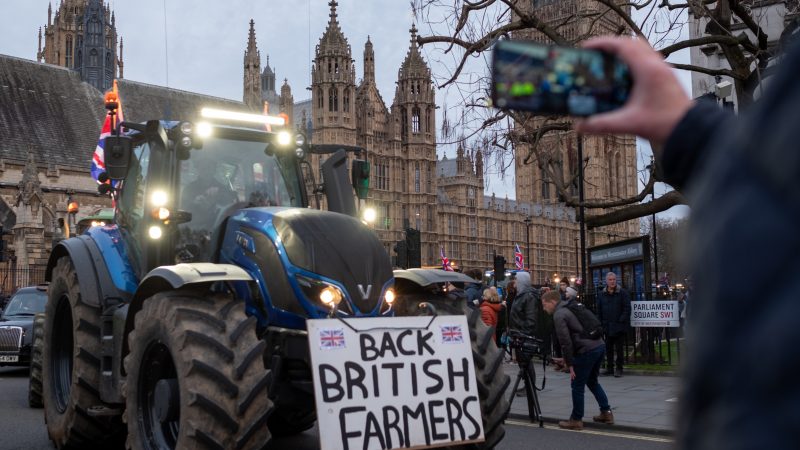
No political party has ever formed a government without at least some rural voters. At the most recent election, Labour made enormous strides forward with rural Britain.
Fabian Society analysis found the party went from representing just two of the most rural constituencies to representing 40. Even in seats that were only partially rural, those rural voters often made the difference between defeat and victory.
Since the Budget, these rural votes have enjoyed an all-too-rare time in the spotlight. Numerous commentators have argued that the governments’ reforms to inheritance tax have put Labour’s rural seats at risk. The Telegraph has argued ‘the showdown with farmers risks defining Starmer’s government’, while the I suggests that ‘Labour could lose 59 seats over farmer inheritance taxes.’
However, the likely political impact is just as inflated as their supposed economic impact. In fact, for most voters in rural areas, inheritance tax changes are unlikely to make a difference to how they vote in a few years’ time.
They are not farmers (many of whom will not be hit by these changes despite the scare stories), not employed in agriculture – and will not be affected by this change. While they are more likely than average to care about the future of British farming, rural voters are not massively different to those in towns or big cities.
So, to keep vital rural seats at the next election, Labour must focus relentlessly on showing it understands the real concerns of those who live in rural communities, not the vested interests of those represented on the front page of The Telegraph. Because while inheritance tax changes alone are unlikely to shift rural voters away from Labour, ignoring the countryside will. That raises the question: what do rural voters really care about?
What do rural voters care about?
Fabian Society research has found that voters in rural communities care more about the challenges facing their immediate family such as getting a GP appointment, the cost of essentials, and ensuring their kids get ahead.
Just as rural voters worried about the cost-of-living crisis, NHS waiting lists and immigration at the last election, they will probably make their decision on similar issues at the next election. And ultimately, Ronald Reagan’s famous formulation– ‘are you better off now than you were then’ – applies as much to voters in rural communities, as it does to those in towns and cities.
Our research also found significant rural disaffection pre-election – with many people believing their communities were neglected. When asked ‘is your local area prioritised by politicians in Westminster when decisions are made about the future of the country’, 70% of rural respondents said that it wasn’t.
This was higher than across Britain as a whole, where 62% felt their area was not prioritised. Labour has to address this with a story, rooted in the values shared in towns cities and villages across the country: home, security and stability.
And they need to show they are different to the Conservatives – who might have taken care of very wealthy landowners, but often sidelined the real issues and the interests of the rural majority.
This story needs to be accompanied by delivering on the things that matter to rural voters.
Winning in the countryside
The Fabian Society identified several policy areas where rural communities felt left behind. Opportunities for young people, housing affordability, high streets, and the availability and affordability of public transport – these are all key issues on which rural voters think they are getting a poor deal on compared to other areas.
Delivery will help address rural disaffection and keep rural votes, albeit not on its own.
Public transport is especially overlooked, and vital for rural communities, many of whom are unable to access jobs because of transport, or who have to pay the expense of running a car. That’s why the government’s £1bn for bus services, announced over the weekend, is far more likely to impact rural voters’ attitudes towards the government than inheritance tax changes.
In 2029, just as ahead of the 2024 election, Labour’s route to victory runs through the countryside. But ultimately, the inheritance tax protests should not distract the government from the real task of delivery and narrative.
From strengthening rural bus services to fixing our NHS and cutting the cost of living, the government can have a unifying story of the difference it has made in just five years. If it can get the policy and the story right, all these column inches in The Telegraph will come to nothing on election night.
London farmers’ protest: ‘This might just be round one of Labour versus farmers’

‘Get in a row with farmers’ was probably not high on the government’s ideal November to-do list. Especially given its already alarming poll ratings, and the British public’s misty eyed romanticisation of agriculture.
But here we are, with hundreds of farmers descending on Westminster today for a ‘day of action’ to share their dissatisfaction with MPs over measures brought in by last month’s Budget to limit the exemptions farm property gets from inheritance tax.
The government’s approach will be to try to defuse the situation, emphasising that most farmers will be unaffected and that all they are doing is ensuring the richest pay their fair share.
Yet as it draws up its response, it must look beyond the short term, and recognise that this is unlikely to be the last time it comes into conflict with the farm lobby. John McTernan exaggerated unhelpfully when he likened the stand off to the miners’ strike last week – things are not that stark.
A ‘war on farmers’?
Accusations from the other side that Labour has declared war on farmers are also clearly overblown. Nevertheless, the government needs to recognise that this may end up being round one of an ongoing bout, and strategise appropriately.
This is a government whose two biggest priorities – the first two of its missions – are raising economic growth and achieving the climate transition. Both involve doing things farmers will resist.
On economic growth, there is the direct issue of Britain’s stagnant agricultural productivity, something any government seeking to take a supply side approach to growth needs to confront (it is easily forgotten that even Liz Truss listed the issue among her six supply side priorities).
At the very least, that is going to involve hard conversations about the shape of their industry –scale, methods, and particularly the age profile of farmers. One positive consequence of the inheritance tax changes might be to encourage some of the 38% of farmers that are over 65 to sell up a bit earlier – if only to their own children – which could support innovation.
Then there is the issue of subsidies: famously, New Zealand has seen some of the biggest improvements in farm productivity following the phasing out of most government support in the 1980s.
A more immediate issue is land use. Following the inheritance tax announcement, many farmers were quick to point out that they are asset rich, but cash poor. The National Farmers’ Union chose to highlight their “extremely modest” return on capital, averaging less than 1% – but from an economists’ perspective, that suggests inefficient use of resources.
The government’s plans for planning reform and housebuilding may also lead them into conflict with farmers. The Home Builders’ Federation blames the leeway given to farmers in terms of exemptions from nitrogen pollution regulations for thwarting the construction of 160,000 homes. It is interesting that it has gone after agriculture in this way – in the Netherlands, farmers and those in favour of construction came together to resist the regulations.
On the environment, confrontation does not seem so imminent, but surely cannot be put off forever. Agriculture accounts for 12% of UK greenhouse gas emissions, and the Climate Change Committee, an independent advisory body to the government, has expressed growing frustration that “total emissions from agriculture have not significantly decreased since 2008”.
It has demanded an acceleration of progress and clearer policy, with its outgoing Chief Executive saying the government can no longer afford to “run scared” of confronting farmers on emissions. The Climate Change Committee says meat and dairy consumption should fall by 20% over the course of a decade; agricultural lobbyists deny livestock numbers need to come down at all.
Labour also has a mandate to clean up rivers, and while its focus has been on water companies, at some point it will need to address the fact that half of nitrates in rivers and a quarter of phosphates come from farms. In fact, more rivers are affected by agricultural pollution than wastewater run-offs.
Handling controversies
There are similarities between the current controversy and the government’s uncomfortable position on Winter Fuel Payments from earlier in the summer. In both cases, the policy decision it took was reasonable, but put them at odds with a vocal constituency that enjoys broad public sympathy and support – then pensioners, now farmers.
Doubtless there are those who believe the government should u-turn on these contentious policies, but I think a better lesson to take from the summer is that the government did not explain clearly enough why it was taking the decision it was, and how it fit into its wider governing strategy.
Farmers are a formidable interest group to take on, with the majority of people saying they would back farmers if they were to go ahead with a proposed strike. At the same time, it is unclear how deep that goodwill really runs.
There is a risk of farmers overplaying their hand, turning people with what might come to appear a hyperbolic response to defend the interests of millionaires. Means testing Winter Fuel Payments affects millions of households; the inheritance tax changes less than 500 farms.
The government needs to move carefully, avoiding unnecessary antagonism and bringing the sector with it as far as possible. But it must also recognise that growing and decarbonising the economy, and building housing and infrastructure may bring more conflict.
It would be better to get out in front of these tensions rather than papering over them, explaining why change is necessary, even if it is not popular. That is not an easy road to take, but a government seeking to take the tough, responsible decisions necessary for national renewal doesn’t get to do things the easy way.
‘Farmer protests and Reform’s threat loomed large at Welsh Labour conference – but threats remain on the left too’
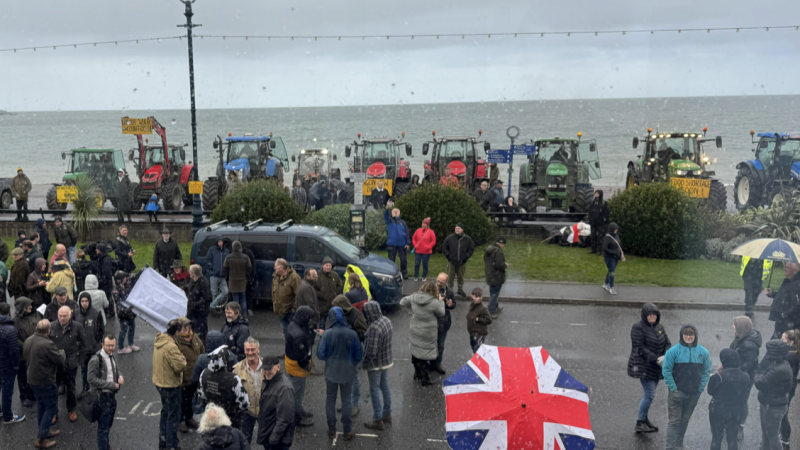
The Welsh Labour Party is worried about Reform; that was my main takeaway from a weekend in Llandudno with the Welsh party for its conference.
At a briefing event for activists on how to sell Labour policy on the doorstep, Constituency Labour Party delegates and councillors were given a fact sheet on how to counter unhappiness over the winter fuel payment decision (“The last UK government wrecked the economy, leaving a £22bn black hole in the public finances”; “There were no easy options, but not acting was not an option”).
All the attendees who spoke were finding significant anger about the decision, often from voters who fell just above the pension credit threshold.
All attendees were worried about Reform, who put in a strong performance at the general across the South Wales valleys. One member from Torfaen, where there are already 3 Reform councillors, expressed the concern that they could take further council seats.
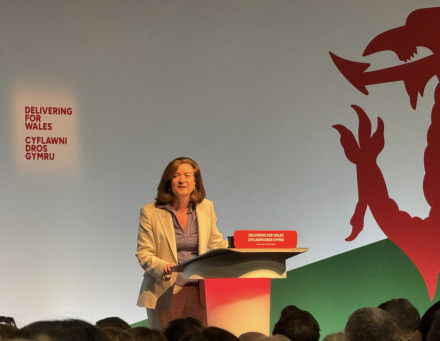 Out amongst the stalls, one charity employee focused on lobbying the Senedd was also pessimistic, predicting that Reform would at minimum take a substantial number of seats, and even be in with a smaller chance of wholesale control.
Out amongst the stalls, one charity employee focused on lobbying the Senedd was also pessimistic, predicting that Reform would at minimum take a substantial number of seats, and even be in with a smaller chance of wholesale control.
Reform’s viability at the next set of Senedd elections in 2026 is down to more than (supposedly) meeting the political moment; the number of representatives is expanding, from 60 to 96, and the voting system is changing, meaning a potentially easier road to Cardiff Bay.
SIGN UP: Get the best daily roundup and analysis of Labour news and comment in our newsletter
The threat of Reform was also addressed by the conference’s two headliners. Keir Starmer, speaking on Saturday morning, commented that “politics in our times is volatile and it can change very, very quickly”, in a nod to potential flips in the Senedd.
Eluned Morgan was more direct in her assertion that Nigel “Farage has no more interest in our country than he has for the people of Clacton”, before arguing that “Wales is not a one night stand. It’s a country”.
The biggest story of the conference (where motions debate was comradely to the point of inertia; I saw a smattering of hands go up to oppose a motion on nuclear power, but unanimous passing was largely the order of the day) took place outside the hall, on Saturday morning, when a convoy of tractors parked up to protest Labour’s plans on inheritance tax.
Starmer addressed opponents of the budget – whose honking horns could just about be heard in the hall as he spoke – fairly head-on, saying he would defend its policies “all day long”. Nonetheless, there was a feeling that the farmers outside were avatars of the broader threat bearing down on the Welsh party from right wing populism.
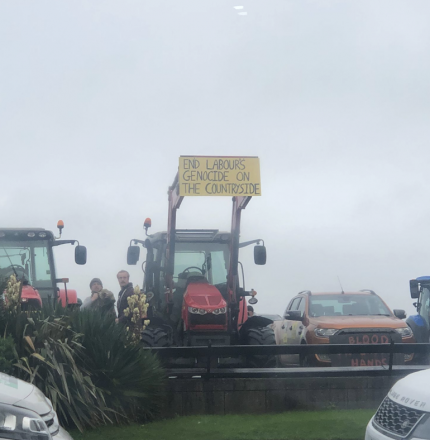
I spoke to one person, however, who thought the threat of Reform should perhaps not be the party’s foremost concern: one Senedd member was more worried about the votes the party could lose to the left, to the Greens and Plaid.
It’s undoubtedly a valid concern, and one common across the wider party since the general election this summer returned 4 Green MPs and 5 independents. It also gestures to the danger of over-deciding a narrative before it’s happened (that Reform will make big gains; that the ill feeling of the protesting farmers and those unhappy about winter fuel payments will flow naturally to Farage’s party).
The reasonably substantial pro-Palestine protest that took place outside the conference venue got far less attention than the farmers’, but it would be remiss not to note it or to treat those sentiments as business as usual or priced in. For the Welsh Party, as nationally, losing votes is not a zero sum game: you can shed support to both your left and your right.
Eluned Morgan is clearly well liked; people talk about her with genuine warmth, and her first speech to conference as First Minister (she walked out to “We Are Family” by Sister Sledge) was high energy and well received.
Having been an MEP and a Labour peer before coming to the Senedd in 2016, people seem happy to have an experienced hand on the till after an electorally successful (following July’s election there are no Tory MPs in Wales, full stop) but internally fraught (Vaughan Gething’s scandal-dogged 4 month leadership came to a close just after the general election) year for the Welsh party. Happy though people may generally be with Morgan, the common view is that the next few years will not be plain sailing.
A journalist’s job is, famously, not to report that people are saying it’s raining, but to look out the window and check. People at Welsh Labour were certainly saying they are worried about Reform. Given that, when looking out the window, the first thing one saw was tractors manned by irate farmers with signs saying “end Labour’s genocide on the countryside”, it seems like they might be onto something.
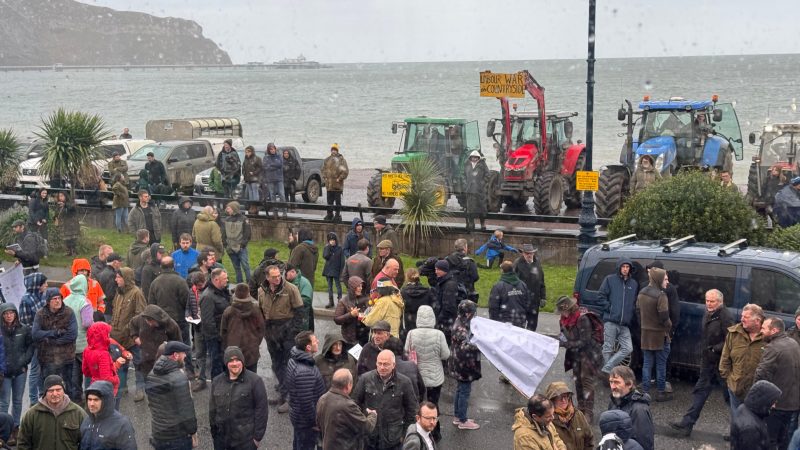
Senior Welsh Labour figures have sought to reassure farmers angered by changes to inheritance tax, who picketed outside the party’s Welsh conference.
Dozens of protesters gathered outside the Venue Cymru in Llandudno for the first day of Welsh Labour Conference, where Prime Minister Keir Starmer addressed delegates for the first time since entering Downing Street.
From April 2026, landowners will pay inheritance tax on combined agricultural and business property worth more than £1 million at a rate of 20%, compared to the standard 40%.
However, farming unions have warned that scrapping the full relief from inheritance tax could have significant and disastrous consequences on family-run farms, particularly in Wales.
‘Very few will be affected’
Speaking to LabourList, First Minister Eluned Morgan said she represents a rural area and understands the concerns of farmers.
However, she said: “I think it’s important we get clarity on how many are potentially going to be affected by this. There is a lack of agreement at the moment between what the farmers think and what the Treasury says, so we need to bottom that out so that there is an understanding of how many are likely to be affected.
“Our initial calculations are that there will be very few of them that will be affected.”
‘Decisions Chancellor has made do not happen in a vacuum’
Deputy First Minister Huw Irranca-Davies told LabourList that he applauds the work that farmers’ unions are doing in their own analysis of the proposed tax hike and trying to outline an alternative route forward.
Speaking on a panel alongside representatives of NFU Cymru and the FUW, he said: “I do think every individual farm business needs to look at what is the individual impact of this within their area.
“We do have some significant challenges in this space. It’s not just the inheritance tax increase, it’s succession planning as well.
“My message to those outside is first of all, to work with us in the work we are doing in Wales, along with the unions, to make those representations to the Treasury, but also be cognisant of the fact that the decisions that Rachel Reeves has made do not happen in a vacuum.
“Having been a minister in both administrations, I can’t imagine the shock and horror of a Chancellor walking in to find not only did she inherit where the economy was, but there were things promised and committed to that had no lines of funding allocated to them. I don’t think Rachel Reeves is making any decisions lightly.
“I think what Rachel Reeves is saying is we need to find a way in which farmers who also rely on the same public services that we have, that had been promised that investment, now also now need to be part of that wider societal thing to say we are genuinely all in this together.”
Irranca-Davies also said that, if unions can put forward an alternative analysis, they should do so but “do it in a way that actually brings down the heat in this and actually says let’s look at the data”.
‘Conversation needs to be based in fact rather than perception’
Welsh Secretary Jo Stevens echoed the First Minister’s comments and said the conversation on inheritance tax reform needs to be based in “fact and reality rather than perception”.
In an interview with LabourList, she said: “I think the numbers need explaining – if you are a farming couple and you want to leave your farm to your children so that it passes through the generations, you can do that. You can leave your farm and using all the tax allowances that are available to you, you can leave an estate of up to £3 million to your children without paying a single penny of inheritance tax.
“If you are fortunate enough to have assets that go beyond that, you then only pay at half the normal rate of inheritance tax and you have a period of ten years in which to pay your tax liability.”
She also stressed that, according to Treasury figures, only around 500 farms a year would be impacted by the Budget announcement and also underlined the need to secure funding to improve public services.
“Farmers use the NHS, farmers send their children to state schools – we all want good public services and we were very clear in our manifesto that we would ask those who had the broadest ability to pay,” she said.
Prime Minister defends tough decisions in speech
While the Prime Minister did not directly address the concerns of protesters in his speech to the conference, Keir Starmer said: “Make no mistake – I will defend our decisions in the Budget all day long. I will defend facing up to the harsh light of fiscal reality, I will defend the tough decisions, that were necessary to stabilise our economy, I will defend protecting the payslips of working people, fixing the foundations of our economy, and investing in the future of Britain and the future of Wales, finally turning the page on austerity – once and for all.”






